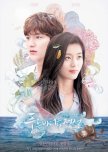
Fun. Touching. Plus light-heartedly questioning the matter of course of human interaction
"The Legend of the Blue Sea" refers to a very old Korean legend that originally tells the lovestory between a mermaid and a fisherman. However, the KDrama is just loosely based on this fairy tale.In the rich Korean folklore of "Imuldam" (mostly oral shamanic songs, myths, fairy tales and folk tales) which is still very much alive today, there are frequently supernatural beings that move around in the earthly dimension - whether mermaids, a nine-tailed fox, a Goblin, or other spirits. These "Imuldam" are particularly inspired by shamanism and Buddhism. KDramas repeatedly pick up motifs from this tradition and find contemporary ways to keep them alive and reinterpret them. The special attraction arises from the fact that our human world receives a different value, appreciation and perspective through the eyes of those non-human creatures less influenced by time and space.
"The Legend of the Blue Sea" is based on a mermaid caught in a net by a fisherman in the early Joseon era. Then he fell in love with her. However, mermaids rarely feature in Korean folklore otherwise. The topic makes a nice link to western tradition and that's probably how it was intended. Also, parts of the KDrama play outside of South Korea - in Spain.
At the same time, the story takes up another, widespread and popular motif in KDrama orbit: reincarnation. Most of the time it is about souls that were not able to complete certain experiences in the past and are confronted with these or similar situations again in their present incarnation - in order to do things better or differently. In "The Legend of the Blue Sea", the historical fairy tale from back then and its version, transposed into the present day, are developed in parallel in two narrative threads. Just as the protagonist (and also another character) slowly (again) remember their past life, we, too, experience what really happened back then. Eventually the question arises whether life must necessarily repeat itself or else other decisions could be made.
Actress Jun Ji-hyun obviously enjoys her character as a humorous, mischievous mermaid, innocently and ignorantly experiencing the modern human world. With her performance she definitely jazzes the story up. Her sometimes almost naive trust, which is a bit reminiscent of a puppy in places, stands in warming contrast to the distanced, calculating coolness of her Jack of Hearts in 2017. The picture is completed by - here and there - being able to look back into their Joseon past, where he rather personifies an amorous, honorable nobleman.
Ultimately, this KDrama offers a well-designed dramaturgical variety of telling an enchanting love story in two different ways - and at the same time (with a twinkle of an eye) questioning the matter of course of human habits and interaction.
It´s fun and touching.

Captivating. Cinematic. Action-packed, yet offering impressive quiet & heartwarming tuning, too
Gando is the land of the desperate, the realm of the desperados of Joseon. In the 1920s, it was also a territory in which political responsibilities and affiliations were vaguely regulated. Some things may remind you of the Wild West. Yet this Wild North in the Far East is quite different...“Song of the Bandits” is a brilliant Netflix historical drama about a certain chapter of recent Korean history. Moving. Captivating. Cinematic. It exudes the vibes of an Eastern. The KDrama surely is gory action and turbulence at most times, but offers impressive quiet and heartwarming tuning, too. Action-packed it is, yet humor and romance modestly fit in as well. "Song of the Bandits" is astonishingly well balanced in this respect and for a Netflix production, despite its polished and action-driven choreography for a broad international audience, sticks surprisingly consistently to a more subtle Korean series style. Nicely done at all scales. We get a feeling of the Manchurian landscape with Gando impressions filmed at original locations. This all framed within a consistently beautiful soundtrack. It all lasts for 9 episodes (only! Yet?). In spite the overall ambitious commercial production context, aiming at an international “Squid Game”-like success, “Song of the Bandits” was able to impress me with a historically and emotionally complex story with great mimes - Kim Nam-gil, Yoo Jae-myung, Lee Ho-jung and Lee Hyun-wook in their element. But so is everyone else. This is where KDrama and Netflix perfectly come together...
'Bandit: The Song of the Sword' is the original title. In fact, people don't swing swords so much as they use firearms. The KDrama is epically processed, offers great emotions, while telling about people and the range of motives for which people are prepared to fight. It's about resistance, obedience, venality, oppression, social affiliation, the fight for freedom. There are even some spiritual thoughts attached to it along the way. It is about the Joseon people, some personal fate, as well as 'the' history of Chosen - an emotionally quite ´Korean´ excerpt of modern history. Its thematic historic setting (even if the rest of the world might not care so much about it, as it is not requisite for an entertaining series pleasure) contains a lot of explosive material by Korean standards. Therefore firearms are in several respects quite consistent in this context…
As far as I am concerned, I do care about the historical context. On the contrary, I find it quite intriguing - besides the dramaturgically action-packed and emotionally charged story with its complex, interwoven relationship dynamics and conflicts. As I said, you don't really need to know the background to be enthusiastic about "Song of the Bandits". But if anyone might be interested, see the historical side note about 'Gando', the border region on the north bank of the Tumen river, which today also marks the border between northeast China and North Korea.
PS:
Yep, the ending of the story...
If you like, you can dream of more. It could be possible. Yet, it would still go on and on.
Who knows if there may be a sequel...
Nevertheless, from my perspective the ending is quite fitting. (Whether I like it or not.) In terms of the historical events, things are as they are. We want fiction to write a different ending, but it still wouldn´t be any better, rosier or brighter for hardly any of the various protagonists... Therefore, from a Korean perspective the ending of this story remains true to the spirit of the actual Chosen-history: For Joseon people it is and remains unsatisfactory, unfair and painful. ´We´, as an international audience (temporarily and figuratively with our personal discontent), can/shall/must/may thus empathically share this collective emotion, too.
-----------------------------------------------------------------------
SIDE NOTE: --- Gando, also called Jiandao, and today Yanbian ---
Gando historically stands for a specific borderland. To this day it is a region with a high proportion of people of Korean origin.
Gando is a small, perhaps inconspicuous scar in Korean history – yet a scar that is still weeping, sort of...
Gando (and Manchuria in general) is also associated with the regrouping of the Rightous Army and thus with the patriotic pride of resistance against colonial oppression. With "Song of the Bandits", the issue of Gando has now obtained an impressive, international onstage introduction...
This 'Gando', Jiandao or Yanbian was the last nail of hope for an increasing number of desperate people from Joseon (and still is for some North Koreans today) who had nothing to lose and would rather settle for an arduous life and try their luck in this section of Manchuria - a back then relatively undeveloped marshland on the north bank of the Tumen river.
First - in the course of, and especially at the end of, the 19th century - famine and poverty drove poor Joseon people to the far north. Then, at the beginning of the 20th century, it was the hope to escape from Chosen, which was finally officially annexed by the Japanese. The Righteous Army militia was also formed anew in Manchuria at that time.
After the annexation of Joseon, with respect to a relatively large population of Joseon people, the Japanese as part of their aggressive expansion efforts also demanded this coastal territory north of the Tumen from the Chinese. Infiltration was followed by an invasion in 1907, but already by 1909 there was withdrawal again. Officially, as a result of the diplomatic negotiations, the area eventually became Chinese again and Japan received railroad concessions, while the Joseon people remained under Japanese rule due to their Korean descent.
"Song of the Bandits" sets its story in this political quagmire: the decade before the belligerent 1930s, before the Empire of Japan invaded Manchuria, established the puppet state 'Mandschukuo' and used it for its own political and economic purposes. The prerequisite for this was a massive expansion of railway lines - especially the North Chosen Line along the border region between Chosen and Manchuria, that had been built during those previous years, while the Bandits sang their song...
Outlook:
After the end of the Second World War, many Koreans went back to their homeland, but by no means all of them. Around 810,000 people of Korean origin apparently still live in the Yanbian Autonomous District of China's Jilin Province to this day. In 1952, the proportion of the population with a Korean migrant background was around 60 percent. Then, Korean language was official. However, especially since the late 1990s, the Chinese government had specifically tried to force linguistic and cultural assimilation in order to counteract political currents in South Korea and discussions about a possible legitimate Korean claim to 'Gando'. These currents believe that - regarding those dubious events of the early 20th century and Gando Convention between Japan and China becoming obsolete with the ending of the World War II – this Gando territory actually is political void and should now belong to (in this case North?) Korea. Thus, Gando's territorial status for some still is not satisfactorily resolved…
Incidentally, desperate North Korean refugees are continuously trying to get to China via the Tumen river, which is icy during the long, cold winter months. Thus, Gando territory invariably remains a last nail of hope for desperate Koreans even up until today...
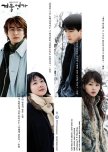
An impressively touching love story. Performed with passion. However, It´s makjang. Be prepared.
The biggest impetus for the KWave came from "Winter Sonata" - this KDrama is almost a blockbuster among KDramas. Its success was enormous. The series sparked its own fan tourism to filming locations on Nami Island, Geojie Island and Chuncheon that continues to this day. The soundtrack also wrote history. In the meantime there is an anime version of the story, a musical production as well as a manga and a Playtstation version...The love story is told in an impressively touching way and performed with passion. In beautiful pictures and with plenty of dramatic twists. The chemistry between the two main actors is perfectly tuned. Bae Yong Joon even shines in two roles at the same time.
However. It is makjang! Twists and turns awaiting around each and every corner. Be prepared for sorrow. You might get angry more than once. The protagonist´s can get on your nerves. For sure. Don´t complain. I told you. It is truely astonishing that still (if you are ready to sympathize to some extent) you will ´enjoy´ the show. ... whereas ´joy´ might not exactly hit the spot... :-)
In case you are not aware (as I wasn´t at first):
Since the story begins in the youth of the main characters, you also get an impression of the Korean lifestyle and everyday life in the late 1980s and 1990s, with true ´democracy´ in South Korea still being in diapers and a conservative, strict, authoritarian aura dominating everyday life. When I saw the series for the first time, I didn´t know much about the political and social conditions. Plus from my German background those morals, values and virtues all seemed old fashioned and in my life rather outdated - it reminded me more of the world of the old black and white movies of the 1930s and 40s: hierarchies and manners, the decisions of the protagonists, the prevailing moral concepts, all of which I - today, far away in Germany - could only shake my head at. Now, as I have learned more about South Korean culture, I know better, where this is coming from... Sympathy and compassion are thus enhanced.
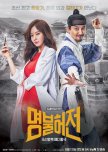
Time-travel with an enchanting encounter between traditional medicine & modern medical technology
Because "Live up to your Name" chooses time travel as the starting point for the action, the KDrama is able to contrast traditional medicine as well as modern surgery and medical technology in two historical time zones. This sprinkles a lot of color over the topic and opens up a perspective that does not have to polarize. This rapprochement is rounded off by the enchanting development of the relationship between the protagonists - the modern day surgeon in modern Seoul and Heo-im from Joseon days, who get emotionally involved over the course of the story, although their personalities could not be more different."Live up to your name" juxtaposes modern surgery & medical technology as well as traditional Korean medicine, which is recently becoming more and more popular in the increasing medical tourism in South Korea. In this context, the audience is introduced to a luminary of traditional Korean medicine who made a considerable contribution to acupuncture in his time (16th century) - Heo-im. The KDrama guarantees an entertaining and lively excursion into some background knowledge about attitude, methods and possibilities of traditional medicine.
Just seeing Kim Nam-gil as Heo-im is worth watching this KDrama. He does an excellent job of portraying the ambivalent personality: there is the simple man from a poor background, whom he would like to escape at any price, and there is the ingenious healer with almost spiritual talent. Sometimes it's quite funny and then again heartwarming and profoundly serious with confident lightness.
In addition, there are the traditional healing methods, the virtuosity in handling the acupuncture needles and the feeling for the flow of energy... this can not only be experienced with the example of Heo-im, but also with the other representatives of traditional Korean medicine. There is also room for dealing with those for whom traditional medicine is mainly a business today - a service that can be sold very well in South Korea these days, especially with a VIP upgrade as a trendy, exotic treatment method in the context of medical tourism. There are the VENDORS of traditional Korean medicine and there are the HEALERS of traditional methods. And then there is modern medicine and the growing market of the health industry. Eventually, what makes the difference (and also offers the common ground between paradigms) are the attitude, dedication and mission when it comes to healing...
------ SIDE NOTE: --- Historical Heo-im (1570-1647)---
His reputation as an acupuncturist preceded the historical Heo-im of his time - not only in the Joseon Dynasty itself, but as far away as China and Japan. Originally he was of humble origin, but due to his incredible achievements in medicine he became the personal physician at the royal court and a government official at the age of 30. During the Japan War, he was able to further expand his reputation through his gifted achievements in acupuncture. However, the nobles rejected him as their equal and excluded him, so that he returned to his village at the age of about 50 and practiced his healing art on the common people there until he died at the age of 77. In recent years he has written a large, well-regarded work, the ChimGuGyungHumBang (book on acupuncture and moxibustion). In it he describes his methods of pain management and procedures in which acupuncture points are not (only) stimulated by needle sticks, but also by heat.
-----------------------------------------------
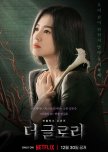
Gripping, intense, a success all round
"The Glory" comes with a drum roll at the turn of the year 2022/23. With a high-end production team in every instance, "The Glory" cleverly intertwines the burning subject of bullying with the long-running topic ´revenge campaign´. The result is gripping, intense, a success all round. (However, one major criticism: Netflix cuts the story in half with a long break in between.)In 2022, for the sad issue of bullying, streaming services cleared the stage several times with their own productions (e.g. "Weak Hero Class 1" and "Revenge of Others"). All of these stories are unbelievable in their brutality and cruelty - teenagers against teenagers! No mercy. Without pity. Without scruples. Without any feeling of guilt. For once, I don't want to blame the streaming providers for the shown cruelty, on the contrary. Maybe the topic is in better hands with them because they have no problem with such radical scenes (compared to TV stations). Isn´t it simply scandalous that such unbelievable violent abuse - and may it be only half as drastic - is part of everyday life in (i.e. South Korean) schools and among young people? Even more scandalous: parents and teachers tolerate it or actively support it and even act up themselves.
"The Glory" swings back and forth between past and present and thus draws a complex picture of the individual characters. Back then the perpetrators, they are becoming victims today. Back then the victim, she finally wants to get out of her role and also make life hell for her abusers. The painful past provides the moral framework, allowing the audience to nod off the plans for vigilantism. Eventually, the protagonist also gains helpers on her way.
Sad enough, in "The Glory" no one is truly happy with their life except for the perpetrator's (still) innocent little daughter.
The bullies of that time live bored and/or stoned and still trapped in their bullying role. Still tangled up in their clique from back then in uneasy ties. None of them found ´true´ friends. Trust and love are words without substance in their life, which rather appears as a shiny variation of Hell disguised with silk and glamourous accessories.
The victim of that time, on the other hand, has found meaning, direction and grounding in her life, no matter how sad the circumstances. Coincidentally, she even made trustworthy friends. Since she has experienced firsthand what hell is like, she can at least distinguish it, as other experiences of brief moments of happiness are also indicated in between. This experience (how happiness actually feels compared to suffering) puts her ahead of her opponents, who aren't even aware that they're living in a hell of emotional emptiness. They only suspect it when Moon-Dong-eun threatens to shake their house of cards and they have to face the illusions of their self-satisfied lives.
The story isn´t completely told yet - after 8 episodes. We will see, how things actually turn out for Moon Dong-eun, as she is indeed messing with someone, who is not willing to give in, whatsoever...
---------- EDIT after finishing the SECOND SEASON: -------------------
Well. Second season is definitely on the revenge-side. Some may say revenge is sweet. In any case it is drastic. And "the Glory" made sure, the mean-spirited deserved it... Among them is so much violence and exorbitant abuse. Almost too much to bear at times. A bit overdone maybe with unnecessary Netflix ruction here and there. Nevertheless suspenseful. Certainly with a coherent ending.
-------------------------------------------------------------------------------
PS.:
Actually, the screenwriter is herself mother of a high school student...)
----------------------------------------------------
SIDE NOTE: ---- Fiction and reality are not that far apart ---
Some might say that the bullying brutality in "The Glory" - such as the curling wand scene - was exaggerated.
In fact, in South Korea in 2006, there was just such a case.
At a middle school in Cheongju, a student was bullied for money by three classmates. For not delivering, she was beaten with a baseball bat, tormented with a barrette, kicked, hit with fists, and burned on her arms with a hot curling wand. The burns didn't even have time to heal because the girls checked the temperature of the curling iron on the victim's arms again and again every few days. On the contrary, healing blisters were specifically removed by the bullies with their fingernails. The brutal beating also resulted in an injury to the tailbone, which resulted in a six-week hospital stay.
In fact, in this actual case in Cheongju, the perpetrators were apparently officially punished after the victim, despite threats, reported the perpetrators by name. And not only the perpetrators, but also the school administration and teachers were apparently sort of admonished. (However, with that the police report ends. We do not know how the victim, the perpetrators and the school dealt with each other afterwards).
--------------------------------------------------------

If you´re in the mood for divertingly wasting your time in (retro-)style...
If you´re in the mood for divertingly wasting your time in style (retro-style to be precise).With a lightweight story, lots of action and some fun, too, this will perfectly do.
Its professionally done. You won´t regret it.
Other than that:
Too fast to be substantial or something that lasts or give something that remains. The focus here is on visual and acoustic effects. Storytelling is secondary. At least there was no saving on top-class actors. And, yes, they are in a good mood.
Recipe:
-top-class cast
-action with car chases
-hip scenery locations in the look of the 80s
-speed
-fancy retro styling - cool retro fashion (if you´re into it)
-all sorts of retro cars - styling and tuning (and noises, too)
-light and camera effects
-deliberately/supposedly ´cool as cool can be´
Final remark:
Never mind the drop of truth behind the backstory - corruption and money laundry in the context of the 1988 Olympics in SK. The bad (and good) guys could be anyone, anywhere. That's just the hook to give an interchangeable action movie at least a coating of its own: a Seoul-Vibe - here in an 80s retro look. (However, even this particular ´SEOUL´ Vibe shown could actually be anywhere - It´s more about an ´80s´ Vibe)
Overall, the movie comes across as a solid action movie production for an international audience.
Don´t expect unique Korean-style. (Except for the cast and their acting of course ... and even they can usually do much better, too...)
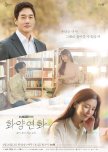
Good stuff. Complex. Powerful at times. Yet you better don´t set the primary focus on the romance.
No idea why the international title is what it is... so beware! If you're expecting a love story here, you'll get one, but certainly not in the way you thought it would. With their motifs and soft focus, the posters for the KDrama also promise more heartbreak of the shallow kind than the story does justice to.
The original title "The most beautiful moment in life - the moment when life becomes a flower" describes the moment in which life (not love) acquires meaning, beauty, direction, form and can blossom. And here we are closer to the topic. The two protagonists have been in love with each other since their student days in the 90s. Yes. But it has grown through their attitude to life, the meaning they give to their own lives, through their principles and quite specifically through the class struggle, the union struggle, the demonstrations for more democracy. By boldly standing up for what they believe in, life is transformed into a (bright, fragrant, inspiring) flower.
To reduce life and its beauty to love would not be enough. But love is definitely part of it - just like water or the sun - to let these flowers (which can/want to be a person's life) grow. This flower reveals its inherent beauty in the creative expression of what is important to you, what you stand for, what you believe in.
In that sense, Yoon Ji-soo's seedling came to life after she met Han Yaeh-hyun during his pro-democracy and workers' rights protests. Ji-soo's enthusiasm for Yaeh-hyun's cause didn't go unnoticed for him either.
-------------- SIDE NOTE: --- Early unionists, political protest and rebellion against injustice ---
We are learning about South Korean democracy movement when it was still in its infancy. During the decades of the dictatorship, conservative politicians skillfully exploited the fear of the communist north and consistently interpreted or pursued any commitment to workers' rights as a communist threat. Strikes and demonstrations were always uncompromisingly dispersed and participants and leaders sentenced to prison terms. Even recently, in the last 5 years, trade unionists, fighting for workers' rights, have been and continue to be arrested for "offences against public order". In the case of convictions of corporate bosses/Jaebeol, a pardon usually follows quickly. Unionists, however, always have to serve their long sentences. Recently, for example, the KCTU chairman Han Sang-gyun was sentenced to three years in prison during an organized mass rally for workers' rights (2016) and Jang Ok-gi from the construction workers' union was imprisoned for a protest march for higher pensions for non-permanent construction workers (2017).
---------------
So the context of this love story is quite serious. And the KDrama cleverly wraps and links this 'seriousness' around the love plot of the two protagonists. The story is told in time leaps between then and now. It tells how Ji-soo's father (head of the district attorney's office) opposes the young love, it tells about Yaeh-hyun's father's unsuccessful struggle for worker´s rights, about Jaebeol Jang Sang, into whose family Yaeh-hyun marries, and about the unscrupulous intrigues of father and daughter, as well as the elite family of lawyers that Ji-soo married into. It tells of the intolerable arrogance of the wealthy towards the lower-income classes, which continues in the form of bullying among their children. It tells of courageous class struggle and rebellion against injustice. It tells of the almost hopeless struggle for one's own rights in the face of powerful opponents. And that it's never too late to let the flower of your life bloom.
So, should you watch it? Yes, it´s good stuff. Complex. Powerful at times. But don´t set the primary focus on the romance. Otherwise you might be a bit disappointed.

unfathomable beastliness down to the blood. a search for the good guys could very well be in vain
You better be aware, it can always become more monstrous. For the audience, the first episodes of “The Escape of the Seven” are already quite inhospitable. Surely, among the protagonists one is worse than the other. We immerse ourselves in an unscrupulous world full of greed and devoid of any... …actually, I wanted to write "humanity", but then people also have a bitterly cruel and evil side, which is unfortunately also so very human in all its abysmal facets that it is painfully hurting and we'd rather not see it or let alone experience it... That's what "The Escape of the Seven" is about: The potency of human unscrupulousness... It couldn´t be more repulsive. (Could it?)Crass, brutal and soulless, but everything beautifully polished in HD – this is how the 'beautiful', (one would normally consider) ´desirable´ life of the "Seven" is displayed here. However, soon enough the limits of what is bearable are strained. Admittedly, at first I had to avert my gaze with a shudder. Pretty quickly I dropped this KDrama.
However, the job as a subtitler had me open up for a second attempt. Meanwhile – if I accept the premise: it's about a group of people who are entangled in their unscrupulousness, who are united in their monstrosity not least by their excessive greed and a disgusting obsession with money, power, prestige, rank and influence – I reconsider this KDrama quite original by now. Surely, there are lots of unsympathetic (and shockingly convincing so!) protagonists - that's downright provocative for a TV series entertainment mission. Nevertheless, eventually from the 5th episode onwards, the KDrama is unabashedly still gearing up. It´s like the point of no return. By then there´s no more escaping from “The Escape of the Seven”... You´re on the hook. Because you actually start hoping…(for ´the good´ to finally become true.)
The plot turns out to be a revenge mission cleverly disguised in several respects. AI and deepfakes on the one hand, tried-and-tested Makjang on the other inspire the psychopathic composition of a jungle full of fatal, dramaturgical entanglements. Intelligent, exciting, disturbing – more than once we might think we know what's going on and yet we're wrong. Ruthlessness is certainly one of the leitmotifs in this KDrama.
I only recommend "The Escape of the Seven" if the mood is right - one that demands unfathomable beastliness down to the blood. If we get involved in this KDrama, then we will uncompromisingly be catapulted into a world in which a search for the good guys could very well be in vain...
And there is a second season, too…
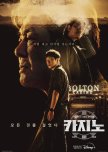
Casino-gangster-crime atmosphere with an exotic ambiance. International style. Takes its time.
"Big Bet" was inspired by the legendary persona of a South Korean casino manager who made it to the top of the multi-billion dollar casino world in the Philippines... until he was framed for murder."Big Bet" is another KDrama that has been divided into two halves in streaming provider style. (Unfortunately, this is kind of becoming the new KDrama fad and I'm already bored to express my anger about it.)
Oh yes, and I'll say it in advance: if you're interested in the series because of Son Suk-ku, you'll have to stick with it for quite a few episodes - he doesn't appear until the end of the first season...
The Disney production deliberately presents itself internationally. Nevertheless, one gets some atmospheric, socio-historical milieu impressions from South Korea - especially from the 1970s and 1980s, because the story is repeatedly enriched by flashbacks. (In fact, the first season is almost one great flashback - with flashbacks within that flashback, so to speak.) While the first season is designed primarily as a character study of Cha Mu-sik, the second season arguably has the real crime thriller behind it. Topic: Murdered South Koreans in the Philippines and the associated dynamic between the South Korean-born, now renowned casino manager, who has now become a murder suspect, and the investigator Oh Seung-Hoon, who was sent to the Philippines from South Korea. So the actual "big bet" only really becomes an issue in the second season.
So what does the first season have to offer?
Plenty of impressions of Mu-sik's childhood days, youth (wonderful: Lee Kyu-hyung as a youthful Mu-sik - although eventually Lee Kyu-hyung has meanwhile left his youth behind him...) and of his first professional steps into Casino world as young adult. The protagonist has his own charm and amazing talents and so we experience Mu-sik, although he radiates some sort of unapproachable aura, as an authentic and fascinating man with plenty of heart and mind, with a quick grasp, good intuition, radical consequence and entrepreneurial charisma.
"Big Bet" is a Korean-American production. It is international in its self-image and presents itself as such. It is made by men and it is about men. About smoking men. Sweating men in suits. Men with tattoos, too. The man with the most screen time is “Oldboy” Choi Min-sik (from the acclaimed 2003 K-Movie). He plays his role effortlessly as a 30-year-old and almost 60-year-old alike (thanks to modern filming and image processing technology). For "Big Bet" he is back in top form after a decade-long break. All in all, in this KDrama we slide into a (conservative) world of men and gangsters. Their wives, if there are any, are at home with children and really don't know anything about anything. Exceptions are the wealthy, and due to her wealth influential CEO Ko (with a rather quick appearance but comparatively lasting impression: Lee Hye-young) and the young, by Korean standards sexually quite explicit, self-determined hotel employee Kim So-jung.
In the flashbacks, as I mentioned before, there is South Korea at times. Nonetheless, "Big Bet" is principally based in the Philippines. Filming there took about 3 months. This promises exotic local hue, although the focus is on the casino and hotel world - which in turn could somehow be anywhere. No expenses were spared with the casting either. Even the supporting roles were selected with care.
In short: "Big Bet" (Season 1) is a solid and ambitious character study of Mu-sik. His Story is told in a sophisticated way and staged well worth seeing. However, the series isn't really a KDrama-like KDrama. Anyone who likes a casino-gangster-crime atmosphere with an exotic ambiance will get their money's worth here. However, the story takes it´s time. It remains to be seen what the second half will come up with. I certainly have high expectation that "Big Bet" will even improve, now that Oh Seung-Hoon intrudes into Mu-sik's world with his investigations and thus will add further dynamic.
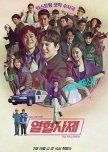
Divine Wrath strikes with unabashed humor, yet healing wounded souls of black, gray + shorn sheep
"The Fiery Priest" is all about Korean humor. You might have to get used to it. At least I did. The first time I approached the series I probably wasn't ready and possibly not in the right mood for such cheerful, tongue-in-cheek fun à la Korean style. I gave up quite early (probably after the first episode). On the second try tough, everything just fell into place. And by now I can say from experience: "The Fiery Priest" is ideal for repeat offenders. I had even more fun then... (And that probably wasn´t the last time I watched...)Nonetheless. Korean humor is special, especially when it comes to the fascination of the intestines - often enough they are gladly celebrated in a wide variety. Here as well. Utter confusion and frenzy are also a must. Instead of tried and tested bar fights and brawls of the western type however, the focus here is rather on choreographed martial arts.
Humor reigns supreme in "The Fiery Priest". Humor determines the pace, the timing, the nuances and the ambience. Slapstick, situation comedy, dialogue jokes, parody, irony - hardly anything is left out. "The Fiery Priest" doesn't take itself too seriously. The central storyline says it all: in the robes of a priest a former NIS agent ensures order and justice. Even the Pope has his brief appearance here. But also the 'sects' with self-appointed saviors flourishing in the country.
And yet, the "The Fiery Priest" has some serious tones to offer, too - besides and in the middle of all the slapstick. The plot background is once again fueled by South Korean backroom liaisons between executive, judiciary, politics and crime. With regard to the personality development of the individual characters, touching emotional moments also come along here and there - comparatively modestly, but nevertheless with impact.
Finally, "The Fiery Priest" also plays out another strength of KDrama: Here you can experience a lot of cheerfully and yet subtly touchingly executed bromance and womance. (However, there's no romance. But nobody has to miss it.) Bromance and womance as well as the variety of embedded side plots inspirit dramaturgical facets, that may touch the heart, having quite something to offer between soft touch and punch. It is simply a pleasure to watch the various dynamic personality developments. (Outstanding actors all along, by the way!)
"The Fiery Priest" spectacularly succeeds in balancing a tightrope act - good-humoredly and mischievously dancing above an unspeakable swamp of injustice, bribery, abuse of power and human greed.
Divine Wrath strikes with unabashed humor, thus along the way healing the wounded souls of the black, gray, and shorn sheep.
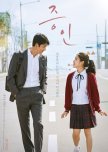
Sensitive, optimistic and even cheerful. No spectacle, and yet the 2 hours somehow fly by.
"Innocent Witness" does not really want to serve any genre. (I assume, in Germany it would have at best as been shown in Television only. Significantly, the movie never made it to European cinemas. Yet, it was shown on the big screen in South Korea and was also shown throughout Asia and Australia. It actually won a whole series of respectable awards. On the list are 55th Baeksang Arts Awards, 39th Golden Cinema Film Festival, 40th Blue Dragon Film Awards, 6th Korean Film Producers Association Awards, 27th Korean Culture and Entertainment Awards and 39th Korean Association of Film Critics Awards ... Those various awards were given for the characteristically sensitive, emotional storytelling and presentation."Innocent Witness" isn't kitschy, it's calm. The story does neither live from driving tension nor offer any dazzling action, just a calm, unobtrusively touching story. The viewers spend a lot of time in the courtroom. However, Law & Order might very well form the framework, but this does not determine what the story is actually about: Communication and reciprocal understanding can only really succeed if you unconditionally focus on the personal world of others, not only your own. This is often forgotten because we think we can easily understand each other when your world and mine seem so similar. (As if we could simply take sameness of a life context for granted.) However, even life perspectives would be similar, this can still not be considered ´mutual understanding´ either. This is mere prejudice. That could work, often does, but doesn't necessarily have to. Most of the time it might fit, so there's rarely a reason to question my personal approach to the world.
"Innocent Witness" is provocative here, because the other person is a young girl with an autism spectrum disorder. In order to reach an understanding, the lawyer and everyone else have to get involved in the world of the protagonist and (arduously?) learn to understand the events and happenings from her perspective. The confrontation with the autistic worldview (in the service of the story quite strikingly, but effectively implemented) may seem crass for most people at first glance, but basically it only demands what we should actually get do in EVERY encounter with every person, with whom we exchange ideas. That is: get involved. Eventually, we are reluctant ... as long as it works otherwise even half-way and the misunderstandings don't catch up with us all too painfully at some point...
"Innocent Witness" pushes the audience to this realization with persistent, warm, quiet tones in a determined and consistent manner. At the beginning there is the girl's question: "Are you a good person?". In the end, the lawyer comes to the realization: "I want to be(come) a good person!" The movie portrays this process purposefully, but quite unspectacularly and without any particular cinematic originality. The gait is characterized by a loving grunt, like a basso continuo, which bathes the punchlines in a warm light and holds the story together on an emotional level. This, however, without wanting to be difficult or too serious. The lacrimal gland is not necessarily strained either. On the contrary, there is also room for a smile, for joy and a good mood.
In short, the essence of the KMovie is the wonderful dynamic between lawyer and witness. Up-and-coming talent Kim Hyang-gi shines in her role as an innocent, often for her autism bullied, young school-girl. Veteran Jung Woo-sung, on the other hand, as a once ambitious human rights lawyer, neither fish nor meat, still single at almost 40, who has gotten a bit off track and becomes seductive because he needs money for his father's Parkinson's treatment. They stumble a little awkwardly into their interpersonal encounter, each in their own way. Dealing with their own feelings and those of others is not their strength. Nevertheless, out of the given need to get involved, a peculiar friendly relationship develops slowly, quietly, subtly, sensitively and sustainably. Initially however, it is quite an ambivalent dynamic. The attorney's original intention is anything but pure at first, when he wants to vet the only witness who claims to have seen his client's murder. In his approach to the witness, he is only concerned with his case and the question of how seriously he must take the witness for the course of his case. The unexpectedly blossoming friendship has an unfair origin that gradually overshadows the encounters. Nevertheless... The two mimes of the protagonists as well as one or the other supporting role have well-earned all their awards, as they embody this dynamic magnificently.
Apparently, the mission of the movie is that people with disabilities are also people with dignity, who we should/must take seriously. Ultimately, however, the mission even goes beyond and demands respectful, serious encounters with EVERYONE - regardless of their origin or clothing, health restrictions or age. We usually avoid those who 'tick' differently, because it seems exhausting and inconvenient to really get involved with someone, e. g. to actually listen, to genuinely want to understand... because this sometimes requires having to question myself and my self-evident attitudes, assumptions and perspectives. It's easier to just take my own worldview for granted on the basis of prejudices as well as superficial encounter and project it onto those around me. Conversely, such an attitude can actually lead to my life becoming superficial... comfortable, pretty, nice and shiny maybe, but superficial...
So, this is a KMovie that plays a lot in the courtroom, but whose verdict on right and wrong is less about the actual legal case - it becomes a mere side issue. It is rather about demanding an honest verdict on our individual ways we interact with our fellow humans: Am I a good person? Am I really listening? Am I truly open to encounters? Are my priorities in life sincere?
"Innocent Witness" doesn't really serve any genre, and yet the story, told in all simplicity, is touching, optimistic and even cheerful. No spectacle, and yet the 2 hours somehow fly by.

Mature romance, yet balanced with the eternal youth residing in the feeling of falling in love.
"Second to Last Love" is processing the topic 'getting old in South Korea' in a playful, sometimes profound, sometimes tender way. 'Old' means having exceeded 40. An 'Ahjumma' can be a swear word for a South Korean woman. Also ´Ahjussi´ for a man. In German it would probably be comparable if the casual 'Du' among around +/- 30 year old people suddenly became a 'Sie' - then you know: now I've fallen out of the '+/- same age'...In South Korea, a large percentage of life revolves around looking good and looking young. Marriage is also a big topic - wedding photos are always placed accordingly large and dominant in the house or apartment. The family ultimately forms the meaning of life, so to speak, if you follow in the footsteps of tradition. In case you stick to this standard - look good, marry well and take care of an honorable family - then everything is fine. Just one step to the right or left of the path creates social turbulence. Women (and men too) must be prepared and able to stand this. The issue will come up more or less confrontationally on every occasion.
This South Korean peculiarity is the starting point for many a KDrama. In "Second to Last Love" as well. However, this story chooses its own fine style and an almost progressive approach to it. Age and age differences in partnership are brought up again and again in several respects. Likewise, married vs. unmarried. Not only the conservative, but also somewhat more free-spirited perspectives and opinions are interspersed in a refreshingly good mood.
While the female protagonist is a career woman and single, the male protagonist lives as the head of a patchwork family. His wife died long ago, as did her fiancé. (Not that they didn't want a partner...) They've both been living their particular single life-style for decades by now and have gotten used to it. They no longer expect anything to change. This is where the KDrama comes in and tweaks a few dramaturgical adjustments in order to shake them both up and question their lives, their life plans, their longings and decisions. They may be 'old' in the eyes of society, but their lives are far from over. And THAT is the key point! There is still time and space for new decisions, for change, even for a second love in the last half of their life. Apart from aging, "Second to Last Love" is also about taking responsibility for one's own life and one's own decisions, including new ones. Despite all the depth, which it doesn't shy away from, the KDrama also has a touch of humor overall.
The protagonists´ 'grown-up' relationship is so delightfully mature and refreshingly grounded. Kim Hee-ae and Ji Jin-hee embody this adult maturity successfully balanced with the magic of eternal youth that resides in the feeling of falling in love. Their rapprochement, their feelings for each other and their attitude towards the other form a pleasant contrast to the more enthusiastic youthful forms that the protagonists are also confronted with...
The story is embedded in a picturesque, idyllic landscape and also allows a look behind the curtains of KDrama industry. The plot and its difficult issues - 'aging' and 'taking responsibility' - are rounded off by a few secondary plots within the patchwork family and work colleagues. A bit of intrigue should not be missing either. Last but not least, and above all, there is the romance, which despite the obstacle-filled terrain unerringly and sensitively paves the way between the two protagonists...
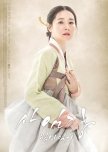
Visually stunning with a truly poetic story. Insights into the early 16th century art included
"Saimdang, Memoir of Colors" is an excellent KDrama with historically impressive dimensions. The focus here is on the legendary artist Shin Saimdang, whose head is also depicted on the 50,000 won note today. The KDrama pays tribute to the great artist and also pays tribute to her roles as a devoted mother and virtuous, yet uncompromisingly progressive woman. The focus is on a time and space transcending, tragic love story - fictitious... or at least not historically documented. (But why should´t it have happened in this way or another? ... :-)----------------- SIDE NOTE --- Shin Saimdang (1504 -1551) ---
... was a painter, calligrapher and poet who was valued in her time and far beyond. Since her father had no son, he gave her (rather unorthodox for a girl) an education and training in literature, poetry, calligraphy, embroidery and painting. Her works as a painter are characterized by their particularly sensitive view of nature and its subtle, sensitive representation. Today only about 40 paintings in Indian ink and mineral colors can be directly assigned to Saimdang. However, it is suspected that many more works of art have survived, although they are not clearly signed as her works. Shin Saimdang has also gone down in history as the ideal of the good mother. She had five sons and three daughters, some of whom also inherited their mother's talent. One of her sons is the even more famous Neo-Confucian scholar and politician Yul-gok Yi I.
-----------------------------------------------------------------------------
In addition, as far as the perspective of traditional art is concerned, the special focus of this KDrama is the nature of the world of animals, plants and mountains. Actually, it could be mentioned here, that South Korea is characterized by several mountains and 21 national parks on more than two thirds of the country's surface. This KDrama aesthetically focuses on the spiritually legendary mountain region around the Geumgangsand - The Diamond Mountain. It probably got its name in connection with the Diamond Sutra of Buddhism. It was a center of Korean Buddhism, traces of which can be dated back to the 1st century. At the beginning of the 20th century there were still more than 40 active monasteries in the region. In any case, the mountain world plays in several respects an important role in this gripping historical drama.
Special dynamics arise through the play with intertwining time and space. There are two plots. One is set in 2017, the other in the early 16th century during the Joseon era. One follows a young art historian writing her PhD thesis on artist An Gyeon's work 'Geumgangsando'. The other follows historical Shin Saimdang through the first 3-4 decades of her passionate yet virtuous life. Parallel to the art historian's research and struggle with it, that is at the same time enhanced and endangered by Saimdang´s diary, insights on the artist´s eventful life are revealed. Both storylines are quite exciting in their own way. Particularly charming: people from Saimdang's time-line seem to have reincarnated in Seoul in 2016 and are once more somehow connected to each other... Surprisingly, the fulcrum where the timelines converge is Tuscany in Italy.
This extraordinary and visually stunning KDrama offers a truly poetic, heart-rending story, added with interesting insights into the special aesthetics and sensitivity of contemporary Korean art of the early 16th century, as well as the paper production craftmanship of that time. It is rounded by an atmospheric soundtrack and, last but not least, actors who are as if absorbed in their roles. At last, there is plenty of makjang, too.
Taking everything into account, the story is effortlessly captivating over 28 episodes.
At the end I was left in bewilderment, yet to some extend somehow surprisingly satisfied, too.
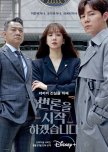
Nonchalant, sassy, intelligent - a solid enrichment among law&order dramas
"May it Please the Court" is one of my favorite series amid the flood of Law & Order series 2022. I appreciate its witty and grounded touch. I also appreciate the playful, sassy and natural at ease dynamic between the two leads. You get wit without silliness and on top of that an exciting story. In addition, the question (which is obviously burning at the moment in South Korea) about the solid handling of the rule of law in the face of apparently overpowering forces that control politics, the executive and the judiciary, is intelligently incorporated into the network of relationships and case processing.The story is based on a book with real cases, written by public defender Jeong Hye-jin ("Let Me Start the Argument"). This makes the Disney production a solid enrichment for current courtroom dramas. In addition, this KDrama doesn´t try to downplay its KDrama roots in favour of international streaming market standards. The KDrama remains true to itself and doesn't rely on more violence or sex than usual It rather builds on proven emotional storytelling with an excellent cast and a loving eye for the nuances.
The intro offers an impressive, brilliantly cool stylization of the KDrama orbit, in which the one percent of society is always involved: the fircely quarreling, shaken by internal intrigues and secrets, outrageously rich family clan, in which everything is about the best law firm, the greatest impact on the prosecutor's office or the fat contract. Here you have to be clean, untouched, respectable (which you rarely are). The profession of choice is a lawyer and/or sooner or later assemblyman and ideally a presidential candidate.
So far, so good... we´ve seen it many times. Now, however, the story is driven by a new powerful perspective: the world of public defenders who handle legal cases from the world of ordinary, often destitute people at the bottom of society. Worlds clash - worlds both with people involved. The interface is incorporated by No Chak-hee, who has lived in either. As the number 1 in the law firm, in which she has just been promoted to the youngest partner, she is being transferred to the mandatory public defense. What she doesn't know: this is mere political calculation of her very esteemed superior. What she also doesn't know: the encounter with her new colleague and the world of public defense will unhinge her worldview and give her work new direction and grounding.
Suspense has the central characters fatefully under control. A series of murders occur. Crimes emerge behind old, long solved and forgotten cases. No Chak-hee realizes that even she can no longer wash her hands in innocence. Guilt. Innocence. Right. Wrong. Culprit. Victim. Justice. Injustice. The perspectives get a bit out of the sounding line.
KDrama at its finest. Good entertainment, while also being socially critical and up to date. Pithy. Nonchalant. Intelligent. Exciting. Romantic vibes included.
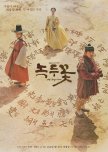
Fight for human rights. A story written with the blood of latest Joseon history. Highly valuable.
Definitely worthwile! "Nokdu Flower" offers a historically remarkable epic with a strong performance. The KDrama excels sort of. It almost seems as if the entire team was all too aware of the ambitious challenge to adequately capturing this short but crucial sequence of Korean history.In the second half of the 19th century, exploitation, famine, a corrupt, incompetent government and weak kings had eroded almost all belief in the existing system, in aristocracy and administration. Then there was the opening of the country to world politics and trades, for which the corrupt Joseon also proved to be profitable. In this historical KDrama it's not so much about the political intrigues around the palace, but about the landowners, administrative offices and Yangban in the provinces as well as the rebellion of the desperate rural people, who simply can't take it anymore.
The struggle for democracy in Korean history, like elsewhere in the world, has been quite bloody. That was last in May 1980 in Gwangju, when the democratic aspirations of the people were brutally crushed by the military. This was so during the student independence movement in 1929 in the fight against Japanese oppression. And that happened in connection with the Donghak movement, too, which had caused quite a stir throughout the country between 1860 and 1894. "Nokdu Flower" is deliberately very close to the front lines of those uprisings for democratic reforms, which then had been for the first time organized on this scale. This forms the perfect background for dramatically intertwined relationship dynamics of two half-brothers, (whose father is one of the particularly exploitative provincial officials who bleed the people dry), as well as the daughter of a merchant, who is used to deal with anybody, even the Japanese, for high profit.
The road to democracy on the Korean Peninsula is definitely rocky. To this day, the reactionary forces are still strong. "Nokdu Flower", however, represents a powerful, unforgettable symbol for the spirited struggle for freedom. The Donghak movement is often seen as the first patriotic Korean movement, since it was also about counteracting the increasing e. g. Japanese influence. But more than a patriotic struggle, initially the Donghak movement was actually about an idea that is bigger than family of origin or nation: It's about basic human rights. (An idea that, not too long before that, had also stirred up the European continent)
Matter follows spirit. And this spirit was shaken up in the rural population of Joseon by a new religious movement: Choe Je-u (1824–1864) created a new faith in 1860: Donghak, which roughly means "Eastern Wisdom". Drawing from Confucianism, Buddhism, Taoism and Shamanism, it sees the divine spirit at work in human beings - in ALL human beings, without distinguishing between class or gender. Additionally, it sees the world as moving in cycles - with a whole new world just waiting ahead.
Nevertheless, it is blood that paves the path to a new era. Eventually, the results of the first Donghak peasant rebellion included a treaty. The "Gabo Reform" recognized the new religion, and among other things, the lowest classes were freed, widows were granted the right to remarry, and penalties for corruption and abuse of office were introduced. Unfortunately, there followed a second peasant rebellion...
This is a story written with the blood of latest Joseon history, sort of.
Overall, a highly valuable production.
--------------- BY THE WAY... ----------------------
...the traditional Korean national dish BIBIMBAP is closely linked to Jeonju and to the Donghak uprising. The heart of the rebellion was in Jeolla province with Joenju being the provincial capital. Among farmers who did not have the time to prepare countless side dishes, it was common to simply mix whatever there was with rice and spices. This food proved its worth, especially when it came to feeding the rebels in their brave fight for new values and a more just future.
... the TITLE TRACK is actually a popular folk song that goes straight back to the peasant uprising. "Nokdu Flower" actually means 'blossom of the mung beans', but here it refers to the nickname of Jeon Bong-jun, leader of the peasant rebellion.
"Bird, bird, blue bird,
bird, bird, blue bird,
Don't sit in the mung bean fields.
When the blossom falls
the farmer goes to cry.
Bird, bird, blue bird,
Jeonju Gobu Nokdu bird,
why don't you fly away
The pines and bamboos are green.
We thought it was summer
yet it's bitterly cold and snowy."
The blue bird refers to the Japanese - they shouldn´t have any business in Joseon and should go away. Joenju and Gobu are legendary places of the uprising. Nokdu refers to Jeon Bong-jun´s nickname and the riot. However, Nokdu, the mung bean, also refers to an important agricultural product and food. Falling blossoms indicate a bad harvest. The 'summer' stands for the first uprising, the 'cold winter' for the second. The song was probably born during the execution of the leader Jeon Bong-jun and has since become a nationwide folk song in several different versions.


 9
9 37
37 15
15


















